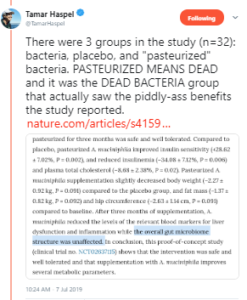Industry-funded study of the week: Almonds
Title: Almond Consumption and Risk Factors for Cardiovascular Disease:A Systematic Review and Meta-analysis of Randomized Controlled Trials. Lee-Bravatti MA, et al. Adv Nutr. 2019;00:1–13
Method: The authors selected studies that had compared lab values of adults who consumed almonds with those who did not. They found significant reductions in some—but not all—CVD risk factors among the almond eaters. The almond eaters, for example, had lower total cholesterol levels and lost weight during the trials.
Conclusion: “Almond consumption may reduce the risk of CVD by improving blood lipids and by decreasing body weight and apoB [apolipoprotein B].”
Funding: “Supported by the Almond Board of California…The funder did not have a role in the study selection, quality assessment, data synthesis, or manuscript preparation.”
Author disclosures: GR was a consultant for Porter Novelli; EJJ received funds from the Almond Board of California for a clinical trial at the time of the study. MAL-B, JW, EEA, and LK, no conflicts of interest.
Comment: I like nuts and am especially partial to marcona almonds, but I wish the almond industry would stop trying to prove that almonds can perform health miracles. I can easily see why substituting almonds for ultraprocessed junk foods would help reduce markers of CVD risk, calories, and weight: people who eat junk food consume more calories and are more likely to be obese. This study set a standard of 42.5 grams of almonds a day, roughly 1.5 ounces and 200 calories. But are almonds superior to other nuts? The Walnut Commission would argue otherwise, as would the Pecan Growers’ Association. The Almond Board may say it has nothing to do with the study, but it doesn’t have to. Its funding is sufficient to exert influence even if investigators don’t realize it, as I discuss in Unsavory Truth.



